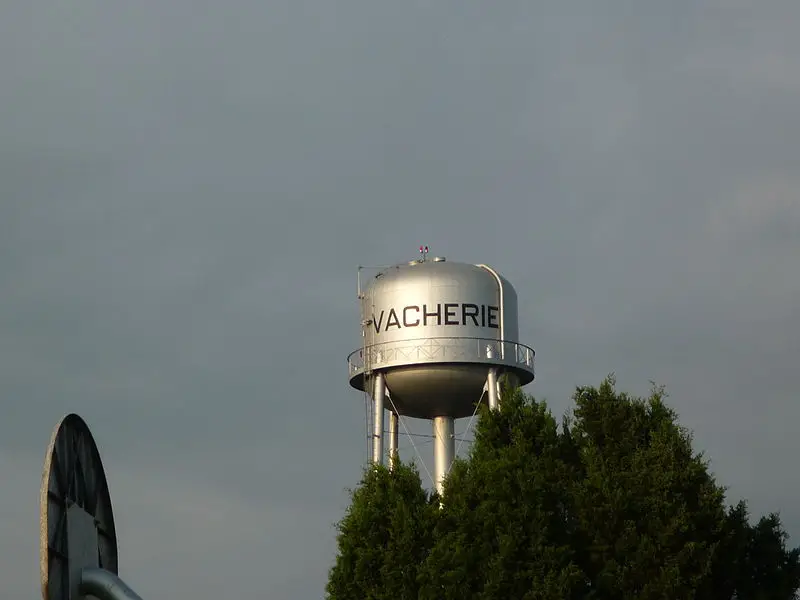
Author’s Note: We are aware that many locals who have taken a stance on this issue now fear for their safety. To protect the identity of those who have spoken out online against La Vacherie Swimming Club, Big Easy Magazine has redacted their names on social media.
Like many subjects on which we report, the truth of the matter here cannot be proven beyond a shadow of a doubt. However, we find the multiple accounts we have received to be credible and consistent with other corroborative accounts.
In the year 2020, Americans have seen numerous instances of racism caught on camera, spread like wildfire on social media, and changing the lens through which we view our world.
For Jill Woods, a native of Vacherie, Louisiana, it only took one tweet.
On Tuesday, July 7, Ms. Woods posted to Twitter. “I need someone in the #media to help me out,” she said. “I have a story on a whites only pool still operating in south Louisiana.”
Then, a firestorm erupted. The tweet gained 4,600 retweets and 500,000 views in just over a day.
Upon seeing the tweet, many river parish residents, black and white alike, set out to share their stories of growing up near the “whites only pool.”
This is a story of La Vacherie Swimming Club, located in Ms. Woods’s hometown of Vacherie, in St. James Parish – just 30 minutes upriver from New Orleans. It is a story about the subtle ways that societies can quietly tolerate racism for far longer than any individual would condone. And it is a story about how discrimination creates a chilling effect on a community – fomenting racial distrust and deepening de facto segregation, in a post- Jim Crow era.
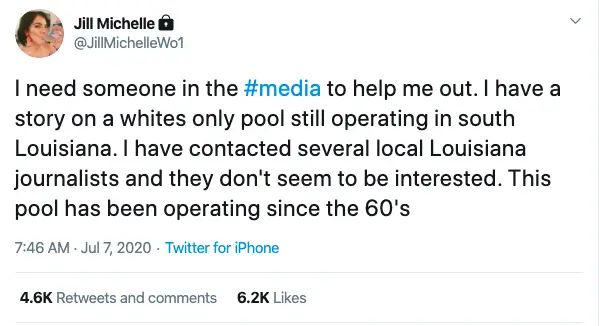
Big Easy Magazine was able to speak to Jill Woods. According to her, La Vacherie Swimming Club, which is registered as a non-profit corporation, has been denying admission to black swimmers for years.
The way it works, according to Ms. Woods and other sources, is this:
To join La Vacherie, prospective members must buy a membership share from someone who is selling their membership. La Vacherie has a waiting list in order to purchase a membership share.
Although this seems like a straightforward and fair way to recruit members, in practice this is a tale of two waitlists.
According to Ms. Woods, white applicants move quickly off the waitlist, achieving membership with ease. Jill Woods, who descends from a family of white sharecroppers in Vacherie, recalls her family purchasing a share within a few weeks of applying.
Woods said that the swimming club tells black applicants that it takes a long time to get off the waiting list. But for the 36.5 percent of Vacherie residents who are black, their applications never see the light of day.
Residents Come Forward
What had apparently been an unspoken rule for black people living in Vacherie, Louisiana suddenly erupted into the public sphere, with residents sharing their experiences with a place called La Vacherie Swimming Club.
“Omg .. I can’t believe y’all don’t know that … that pool been [sic] whites only for a long time,” said one woman who is from the area.

One Vacherie native, who is white, said “I remember being told as a child going to birthday parties at this pool that black people aren’t allowed in the pool because of ‘the product they put in their hair,’ and it literally never made sense to me. This is TOXIC and BLATANT racism.”

Ms. Woods also recalls hearing this growing up in Vacherie. “They say they can’t let black people in because of the grease in their hair,” she said.
Big Easy Magazine spoke to the anonymous author of the above post. She lived in Vacherie until attending college and never recalled seeing a black person at the pool.
“I went to birthday parties where we were told that black people were not allowed because of the product they put in their hair,” she said. “I’m not aware of any written rule the pool had at any point, but the hair is often cited throughout the community as the ‘reason’ people of color weren’t supposed to be at the pool.
She visited La Vacherie Swimming Club “at least” ten times and never saw a person of color there.
Other Vacherie natives have heard this excuse as to why their black friends could not swim at La Vacherie. Another woman talked about her experience as a white person with black friends.
“The amount of times as a kid that I remember hearing that black people aren’t allowed at this pool and how people tried to justify not letting black kids come and swim at this pool with ‘its [sic] because of the products/chemicals they put in their hair’ makes me sick to my stomach,” she wrote on Facebook. “It didn’t make sense to me growing up and it still doesn’t. I remember being invited to multiple parties at this pool and our black friends would never come and I knew why. It’s completely and utterly disgusting.”
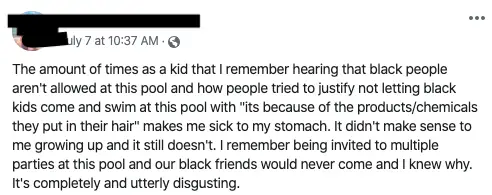
In an email statement, this woman told Big Easy Magazine that she first noticed something was wrong when she was in second grade. “Our whole class was invited to one of our classmate’s birthday parties,” she wrote.
“That classmate came back the next day and told one of our black classmates that his mom said he wouldn’t be able to come. This became a thing over the next few years.”
Big Easy Magazine inquired about her most recent experience with the club denying black people admission. “The last time we tried to have a party was my junior year of high school and our black friends weren’t allowed.”

This particular Vacherie native is now a junior in college. She admits that she cannot say if the policy is still the same as it was several years ago. “I haven’t been to the pool in a few years because the [members] and the people on the board make me extremely uncomfortable.”
Big Easy Magazine attempted to call La Vacherie Swimming Club, but their number had been disconnected. We also messaged several individuals listed as members of the nonprofit board and received no answer.
A black Vacherie woman on Twitter who spoke to Big Easy Magazine reported the practice with much greater confidence. This particular Twitter user’s commentary on social and racial issues gained the attention of President Barack Obama, who now follows her on Twitter.
We asked her if the practice of denying admission to black people or people of color is ongoing. “That has been the rule,” she replied. “Til this day, yes. Yes it is still a segregated pool.”
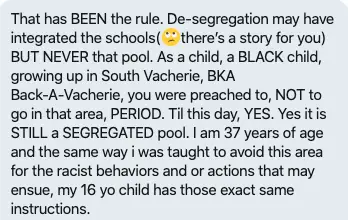
When we asked her if she knew anybody who had been denied admission, she said the result when black people applied was “an inevitable no. These people pay their fees and dues to keep their pool ‘N****r Free.’”
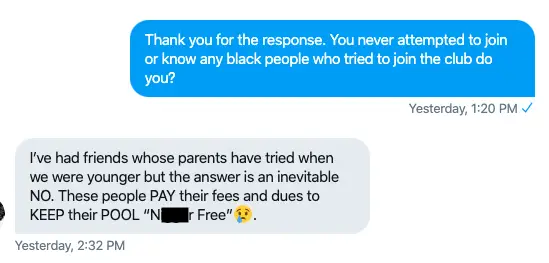
As a result, in 2020 discrimination at La Vacherie, if not overt, may be continued by self-propulsion. Black residents are told to avoid the entire area, and there is little desire to join a pool where they would be unwelcome.
“As a child, a black child, growing up in South Vacherie … you were preached to, not to go in that area, period,” she added. “We heard stories of black kids who’d been beaten or jailed for ‘trespassing,’” she added in a Twitter post addressing the issue.

In yet another exchange, above, a surprised local asked if the pool was “still” whites only.
A friend of hers replied, “to this day.”
La Vacherie Votes Out Diverse Swim Team
In 2014, La Vacherie Swimming Club was one of the members of the River Parish Swim League that voted to kick the Piranha Swim Team out of their swimming league – a decision that stripped 130 children of a place to swim. In a press release from the swim league president Kathy Braud, the league blamed “unsportsmanlike conduct” as one of the factors in their decision.
Piranha Swim Team head coach Haley Montz and assistant coach Blaine Tatje said in a press release that “we have been faced with unprecedented resistance in the form of what can only be called blatant racial discrimination.”
Tatje told L’Observateur that the Piranhas were voted out because 30 percent of their team was black. “We are the only team that has such diversity in our membership, as we do not discriminate in our membership,” the press release stated.
“We do have a lot more black swimmers,” said Craig Wagoner, treasurer of the Piranha Swim Team. “The kids love to swim. The kids love to go to the meets. Practices are fun.”
“It had been such a feel good year for the team,” Wagoner said.
Vacherie Pastor Speaks Out
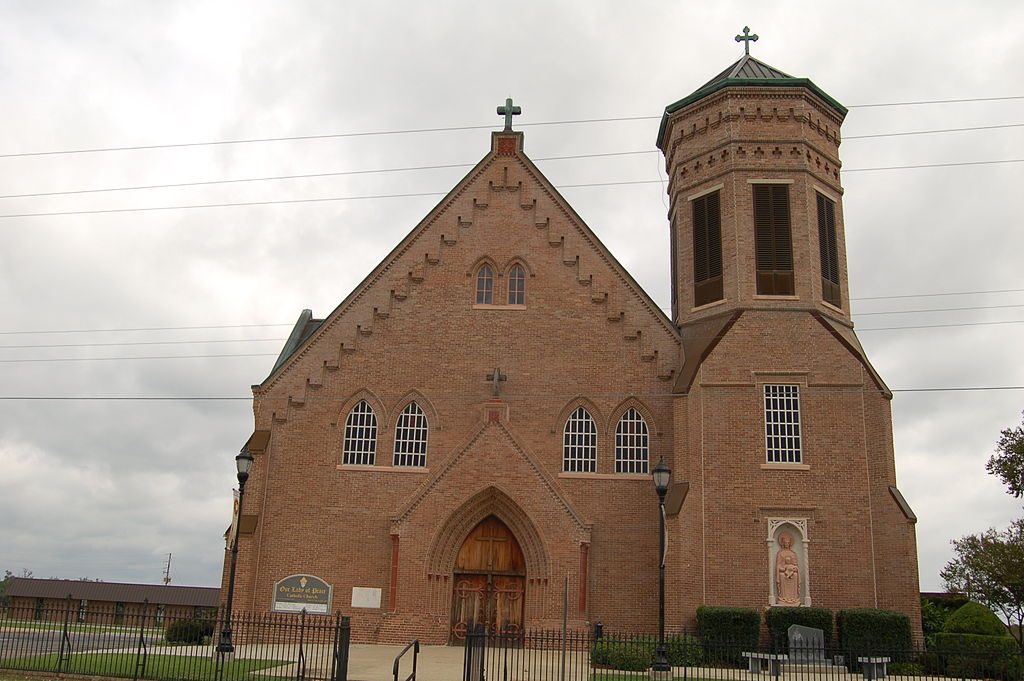
Big Easy Magazine spoke to Father Michael Miceli, who was Pastor of Our Lady of Peace Catholic Church in Vacherie until 2015. Fr. Miceli spoke out against racism in the community during his tenure at Our Lady of Peace and invited Dialogue on Race Louisiana to address past instances of racism in Vacherie. Our Lady of Peace also held a healing service “to apologize for the Church’s participation in and failure to combat racism.”
As part of the healing service, an old building that was once used by the church as racially-segregated restrooms was torn down. Father Miceli burned a piece of the building at the service.

“La Vacherie claims not to have discriminatory policies,” Fr. Miceli told Big Easy Magazine. “However, I had heard from ‘talk’ in the community that they did not allow African-American families to join.”
Fr. Miceli also addressed La Vacherie Swimming Club as part of his efforts to combat racism in his parish. “I publicly asked the question point blank, ‘Are you or are you not racist or discriminatory in your practices?’ I invited anyone who was part of the Club to come and discuss the issue and no one came forward.”
Fr. Miceli does not know if the pool has changed its practices since he left the parish in 2015; he is now Pastor at St. Patrick’s Catholic Church in Baton Rouge. “I have heard that there is a white family who adopted biracial children and they were accepted as members,” Fr. Miceli added. “Members of the club claim that this proves they are not discriminatory.”
Ms. Woods also said that La Vacherie uses these biracial members to argue that they do admit black people. Still, Big Easy Magazine has not found evidence of any other black members of La Vacherie.
A Legacy of American Hostility Toward African Americans in Swimming Pools
The history of segregation in the United States, which runs deep, has often centered around swimming pools.
According to Navigating Rough Waters: Public Swimming Pools, Discrimination, and the Law, by Dr. Stephen N. Waller and Jim Bemiller, this perplexing focal point has several explanations. In the early 20th century, white Americans often believed that “Black Americans were dirtier than Whites and that they were more likely to be infected by communicable diseases.”
After the Great Migration of African Americans to northern United States, city planners consciously avoided building public swimming pools in predominantly black neighborhoods. In the 1920s and 1930s, city administrators began building large-scale public pools, many of which were larger than football fields and equipped with “palatial surroundings—plush lawns and concrete sundecks.”
African Americans were typically relegated to smaller indoor pools, if they had a pool at all. In St. Louis, for example, Waller and Bemiller noted that African Americans represented 15 percent of the population in the 1930s. However, due to the lack of swimming pools, Black St. Louisans took only 1.5 percent the amount of swims that the white population did.
In January of 2020, local minister Betty Claiborne passed away. When she was 20, she was arrested for attempting to swim in Baton Rouge’s City Park pool and was sentenced to 90 days in jail. Laws like Baton Rouge’s rule existed across the country – even after the United States Supreme Court ruled segregated swimming pools unconstitutional in 1955. Mayor and City Council of Baltimore City v. Dawson, 350 U.S. 877 (1955).
In Jackson, Mississippi, after the United States Court for the Fifth Circuit found that their continued discrimination in public amenities violated the Equal Protection Clause of the 14th Amendment, the city government simply shut down all municipal pools. Clark v. Thompson, 313 F. 2d 637 (U.S. 5th Cir (1962)).
In 1969, Fred Rogers, of “Mr. Rogers’ Neighborhood” sought to teach a younger generation of Americans that black and white people can share the same pool, at a time when people still thought African Americans to be unclean or “predatory” according to Biography. In the now-famous scene from episode 1065, Rogers invited the character Francois Clemons to dip his feet in a small wading pool.
According to Waller and Bemiller, swimming pools still exist as a relic of American racial hostility, even though progress has been incremental.
Rougher Waters in Vacherie
The storm caused by Ms. Woods’s online post has now died down. But in the week after speaking out about La Vacherie, Jill had to block hundreds of white Vacherie residents. One resident said that based on the comments from the white community, “I don’t think it may be a good idea to move back to Vacherie.” Ms. Woods currently lives in Houston for her husband’s work but is transferring back to Louisiana.
Another person called Ms. Woods “a snowflake of no value.”

Much of the criticism came from residents who wanted to minimize the incident. “All of this over a f—ing pool,” one resident wrote. “Y’all want to swim, go to the dollar store and buy a damn pool, they are on sale.”
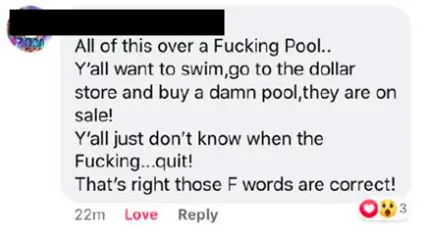
Before her mother died last year, Ms. Woods’s aunt launched a fundraiser to pay for her medical expenses. Some people criticized Jill because they had donated to her mother’s fundraiser.
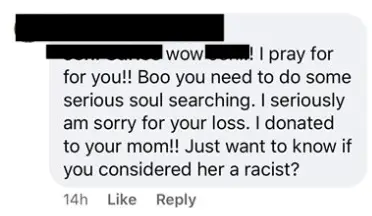
Despite all of the criticism, there is no evidence that anyone came forward and refuted her original claim about La Vacherie Swimming Club. In a community social media group called “La Vacherie, La Louisiane” a black resident inquired about obtaining a share for the club. Her post was deleted.

While Ms. Woods took offense to bringing up her late mother, she is also confident that she is doing the right thing.
“Growing up, my mom said ‘you have a big voice, and you have a sassy voice, and you better use that voice for good.’”
As the border crisis became a point of major contention under President Trump, Ms. Woods actually traveled to the U.S.-Mexican border to protest the child detention camps.
“When things happened at the border, when they opened up the detention camps, I didn’t want my kids asking me what I did or didn’t do,” Ms. Woods told Big Easy Magazine. “I can’t be complacent – I have to speak out for their future. I couldn’t remain silent.”
Ultimately, what drove Ms. Woods to speak out was a concern for her community and desire to live in a more just world.
“This is a safe town. These are good people,” she said. “But what these people are doing is racist and there are consequences for that.”
Update: 7/16/20 (12:10 a.m.) – This post has been updated to add an additional account corroborating the original claim made by Jill Woods.










xxxhdfire.com melissa moore riding big black cock.
This is a fact I live on swimming pool st for at least 20 years. Not once did any African Americans go to the pool. It was on whites people that went to private schools mainly. Then when I started to have kids of course my kids are mix the street started to call the cops for nothing. Saying my kids was in their yard. The crazy thing my kids was only 1 and 2 at the time. My neighbor across the street Leonard and his wife use to own the pool as well hell they may still do.
This is a fact I live on swimming pool st for at least 20 years. Not once did any African Americans go to the pool. It was on whites people that went to private schools mainly. Then when I started to have kids of course my kids are mix the street started to call the cops for nothing. Saying my kids was in their yard. The crazy thing my kids was only 1 and 2 at the time. My neighbor across the street Leonard and his wife use to own the pool as well hell they may still do.
There as much more going on than just the swimming pool!!
You should also include that Jill Woods and family held shares to this same pool and attended private schools that were segregated. She was part of the problem. She is a Houston resident and cannot speak to the last 10 years here in Vacherie. If she can change after actually being racist, why can’t anyone else??
Im from Harrytown and y’all been racist every since I can remember but y’all know how to act like y’all not cause they know if they play with us it’s up there we don’t give a damn about that pool being whites only all we know is that y’all better respect us out in these streets cause we are not our ancestors shit can get real and this coming from the Harrytown Gang
Why should this be so surprising? We are speaking of a place that had segregated proms up until 2003/2004.